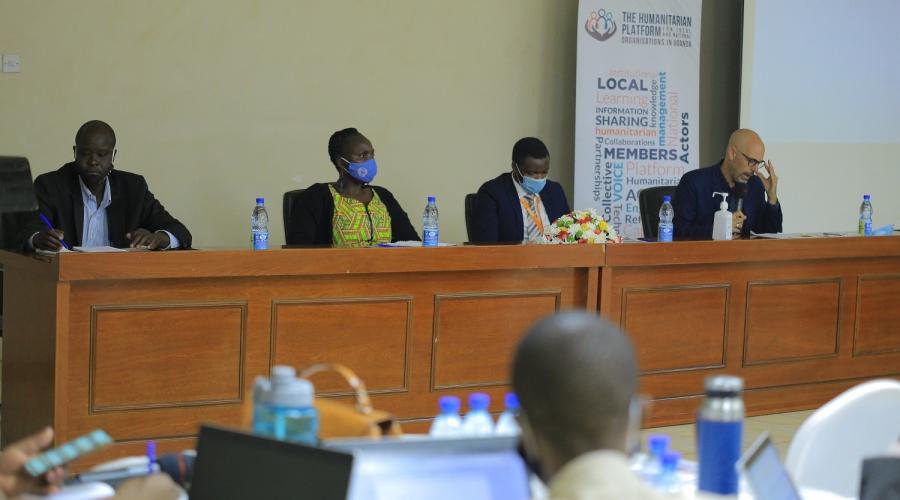
Local Humanitarian Actors Push for the Realization of the Localisation Agenda
With the increasing rise in the number and complexity of protracted crises over the last decade, there has been a corresponding challenge for humanitarian actors to maintain the capacity to respond, at the right scale. To address this challenge, consultations which took place ahead of the 2016 World Humanitarian Summit recommended investing in “the vision, skills and capacities” of local and national humanitarian actors (LNHAs) to enable a better response – considering they are often first responders, they are vital in creating links to host communities, and can build resilience for future crises. By strengthening local level structures, resources and systems, first responders would be well-positioned to respond to crises themselves, calling on the international community to complement existing capacities.
It is in this regard that UNNGOF under the auspices of the Humanitarian Platform for Local and National Organisations convened annual members’ forum on 29th March 2021 at Hotel Africana. The event that brought together over 80 LNHAs, INGOs, OPM, CRRF and Local Government Officials aimed at providing an opportunity for Humanitarian actors to take stock of the previous year, share experiences, reflections and perspectives on how LNHAs can position themselves and strategize to influence the localization agenda in the humanitarian sector.
Mr. Francis Iwa, ED CAFOMI and Chairperson of the Humanitarian Platform noted that despite the need to work together efficiently, transparently and harmoniously with new and existing local partners, including the private sector, individuals and non-traditional sources of funding, little is being done at the local level yet local Organisations were always the first responders in cases of emergencies. He re-echoed that localization means working complementarily and trust at community level is important in responding to crises as well as other emergencies when they occur. He underscored that partnerships are critical given the cross cutting nature of issues to deal with in the sector. He therefore, advised members to address governance related issues in their respective Organisations that might have stalled the localization agenda from taking off.
In his rejoinder, Mr. Gerald Menya the Assistant Commissioner, Disaster Preparedness, recognized the importance of localization adding that the world was increasingly recognizing the importance of localization in humanitarian responses to crises and other emergencies. The re-echoed the subsequent commitments of the grand bargain such as; 1). 25% of all resources for international non-governmental organization should be going to local actors to respond to crises occasioned by disasters and influx of migration of refugee, 2). At least 1% of international non-governmental organizations’ budgets should be going to environmental restoration; the need for sustainability of interventions by local actors especially where International non-governmental organization have completed their projects to prepare skill the local organizations and lastly, 3). At least 5% of the entire donor budget should go to administration and the remaining percentage (95%) to programmes activities.
However, he underscored the need to establish mechanisms to enforce the grand bargain commitments on ground with laws and policies adding that localization is a participation evolution that enables more locally led interventions through provision of opportunities to local actors by optimizing the comparative advantages by playing to respective strengths and using them collectively as efficiently and effectively as possible. He shared some of the merits of localization including it being cost effective, improves quality of response, contributing to strengthening the capacity, and leads to creation of employment, among others. He also highlighted some of the hindrances to the localization agenda including mistrust brought about by issues such as tribalism, nepotism, and low financial absorption capacity by local actors, lack of transparency around budgets particularly salaries, lack of skills, poor referenced documents and conformity issues, weak policies and legislations, among others.
While sharing the perspectives on localization in the sector, Ms. Mitchell, Program Manager, CRS emphasized the need for International Organisations to empower local actors with the needed capacity and skills in order to position themselves in sustaining project interventions and other responsibilities afterwards. She observed that international aid and donor Organisations have to change the way they responded by working with local communities since one of the major challenges to the localization agenda in humanitarian response was lack of ownership.
Mr. Michael Bruce, Analytical Advisor, CRRF informed observed that localization is about governance, design and sovereignty in decision-making. He added that it is not about redistribution of resources from international organisations to local actors but rather about local actors and local leadership in humanitarian interventions.
“Localization means placing the people exposed to risks of disasters at the forefront”. Said Ms. Juliet Donna. Regarding the absorptive capacity, she advised local partners to work with INGOs in consortia to harness team strengths.
Mr. Obong Charles Okwera, LCIII chairperson, argued that many INGOs operating in the local communities bypass local government structures yet claim to be working for them. He contended the importance for donor agencies to support and complement existing national coordination mechanisms as well as work with local and national responders to address crises and other emergencies. He noted that local actors have the required capacity and experience to implement humanitarian interventions. He urged local actors to continue lobbying and advocating for improved service delivery in their respective areas.
As a result the following were the key takeaways from the dialogue; the need to improve coordination and partnerships among stakeholders and duty bearers, integrate planning and mobilize local actors to actively participate if localisation is to be achieved; there should be broader engagements with all relevant stakeholders including relevant ministries, agencies and departments, among others from which resultant recommendations will be used to inform planning and decision-making; There should be alignment of priorities among International Aid Organisations, INGOs and local actors including LNHAs as well as communities as a catalyst for improved localisation in the humanitarian sector.



